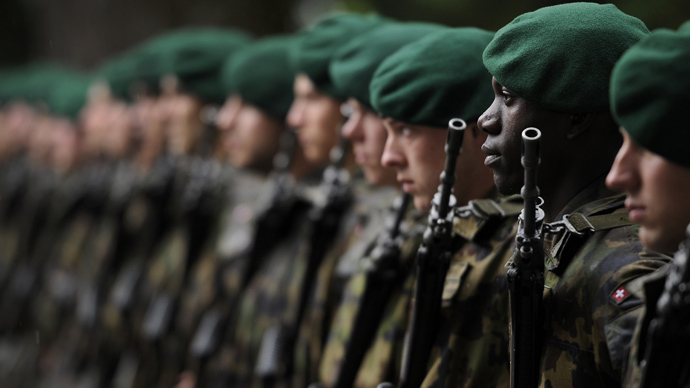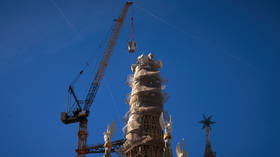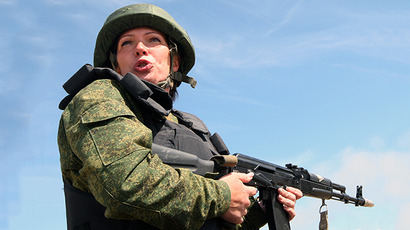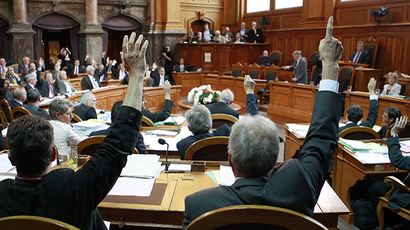No time to play war? Swiss take obligatory army service to referendum

On Sunday, the Swiss are voting on a proposal to abolish military conscription in favor of a voluntary army. The country with no clear foes and a long tradition of neutrality could find better ways of spending money than playing at war, proponents say.
Switzerland, once a proud supplier of mercenaries for numerous wars in Europe, has maintained a policy of armed neutrality for the last five centuries. It isn’t a member of any defense pacts and wasn’t even member of the United Nations until 2002. But it has an army of 150,000, the size of Austria’s, Belgium’s, Norway’s, Finland’s and Sweden’s armies combined.
Under Swiss law, all able-bodied males must take part in compulsory military service between the ages of 18 and 34. This comprises 18 to 21 weeks of basic training and further yearly refresher courses lasting 19 days. Senior officers may have to serve up to the age of 50 and spend more than twice as much time on army duty than ordinary recruits.
Boot camp is praised by advocates as a character-building experience, which teaches working in a team under stress and gives a chance to develop leadership skills. It also serves as a kind of glue for Swiss society, with connections made in the service lasting on in civilian life. For a country with four different language groups, it is seen by many Swiss as crucial for national unity.
The military is also the cornerstone of the Swiss militia, which has a role similar to the National Guard in the US. Those in the army help civilian authorities and respond to natural disasters and other major events. Many continue helping society as volunteers after retiring from the service by joining the fire service, participating in local politics. or serving other public duties.
An anachronism that costs too much
However, there are plenty who see military traditions as an expensive anachronism, which is no longer necessary. The pacifist Group for Switzerland without an Army (GSoA) has gathered the 100,000 signatures necessary to put their abolition proposal to a national referendum.
Referenda are essential to Switzerland's direct form of democracy and are held several times a year at national, regional and local levels. An initiative must win support from a majority of voters and a majority of cantons to be passed and made law.

GSoA, which has been campaigning against obligatory army service since 1982, argues that the country located in the heart of Europe doesn’t need big military firepower to protect itself and that a purely voluntary force would suffice. It criticizes conscription, which excludes Swiss women and disrupts study and work for men, costing an estimated $4.3 billion to the economy annually.
"Not everyone has time to play war," declares the GSoA campaign poster.
The group has pushed unsuccessfully for several referendums in the past, trying to scrap the military, preventing the procurement of American fighter jets, banning all arms exports from Switzerland, and stopping the Swiss tradition of conscripts keeping their assault rifles at home after initial training.
Sunday’s vote is not expected to go in favor of the GSoA. A survey by Swiss television in August revealed that 40 per cent of respondents would reject the initiative, with another 17 per cent leaning that way. The support for the military is particularly strong in the older generations, with 68 per cent of those over 65 opposing the initiative. Less than a third of Swiss people support the proposal.
“Switzerland needs an army,” says Jakob Büchler of the Christian Democrat Party (CVP), a member of the National Council, which rejected the initiative as cited by The Local. “We are a small country, we are a neutral country, and we are a country that isn’t in any defense alliances. We have to therefore organize our own defense and security ourselves, and that’s why we need an army.”
Opponents of the initiative fear that there won’t be enough volunteers for military service and Switzerland would then have to start a costly change to a professional army.
Globalization advancing
Lately, GSoA reasoning has found support from an increasing number of multinational firms who are not happy to see local staff being sent to boot camps, reports Reuters. The contact-building aspect of the military is diminishing too, with Swiss companies being infiltrated by foreigners – just six of the CEOs at Switzerland's top 20 companies hold Swiss nationality – and of course females are climbing the corporate ladder, too. Meanwhile young men nowadays have other options such as internships abroad.
While the GSoA proposal is likely to be thrown out, they are still hoping for a strong showing of support for their stance as they continue their fight. “The more ‘yes’ votes we receive, the greater the pressure will be to reform the army,” says Seraina Patzen, a spokeswoman for the group.
The Swiss military are not objecting to undergoing reform. They have already shrunk the number of troops considerably. In the late 1980s Switzerland had 800,000 soldiers and officers, but by 2003 the number had dropped to 350,000. The plan is to reduce the current army of 150,000 to 100,000 in coming years.
Conscription rules were made less strict. Since 1996 conscientious objectors may serve an extended period in the civil service as an alternative to joining the military.
But the Defense Ministry maintains that a conscripted military is necessary for the country. During a recent media tour of barracks, Defense Minister Ueli Maurer said Switzerland may not face an enemy in the field, but may become, for example, a target of a cyber attack disrupting the transport network. In order for the army to respond to national emergencies, it needs to be able to draw on the best IT specialists, engineers and technicians the country has to offer.














